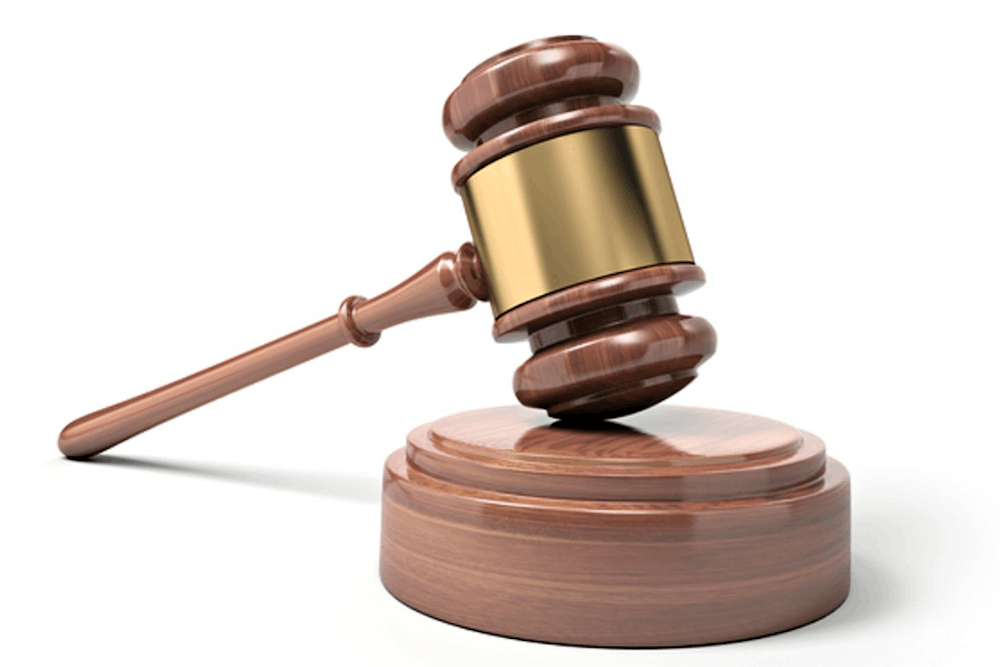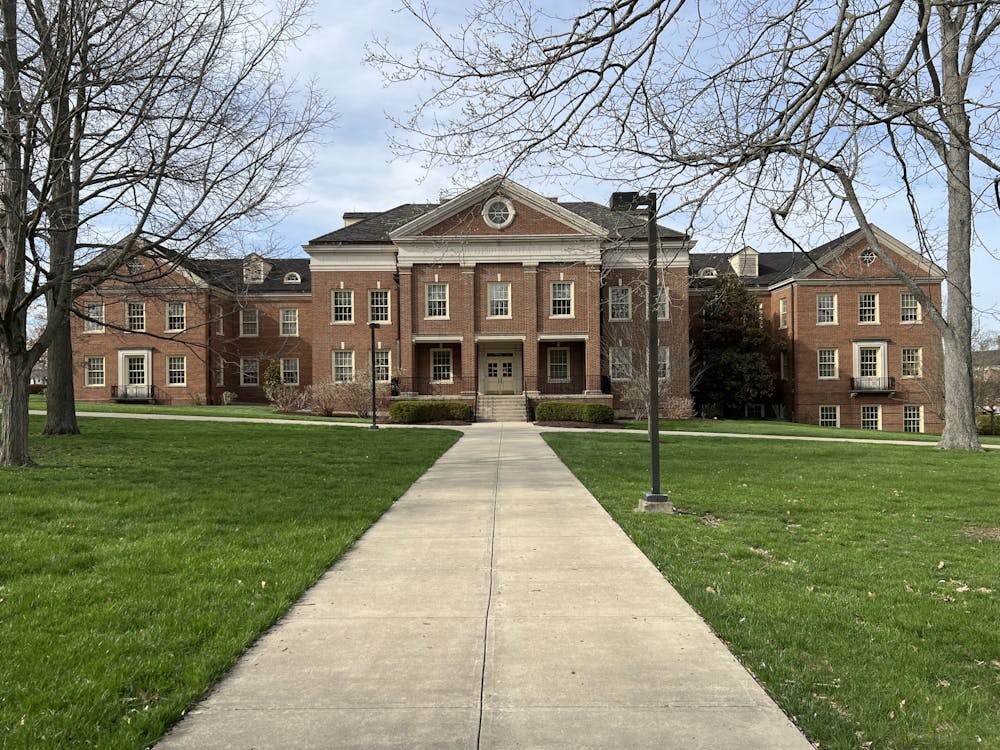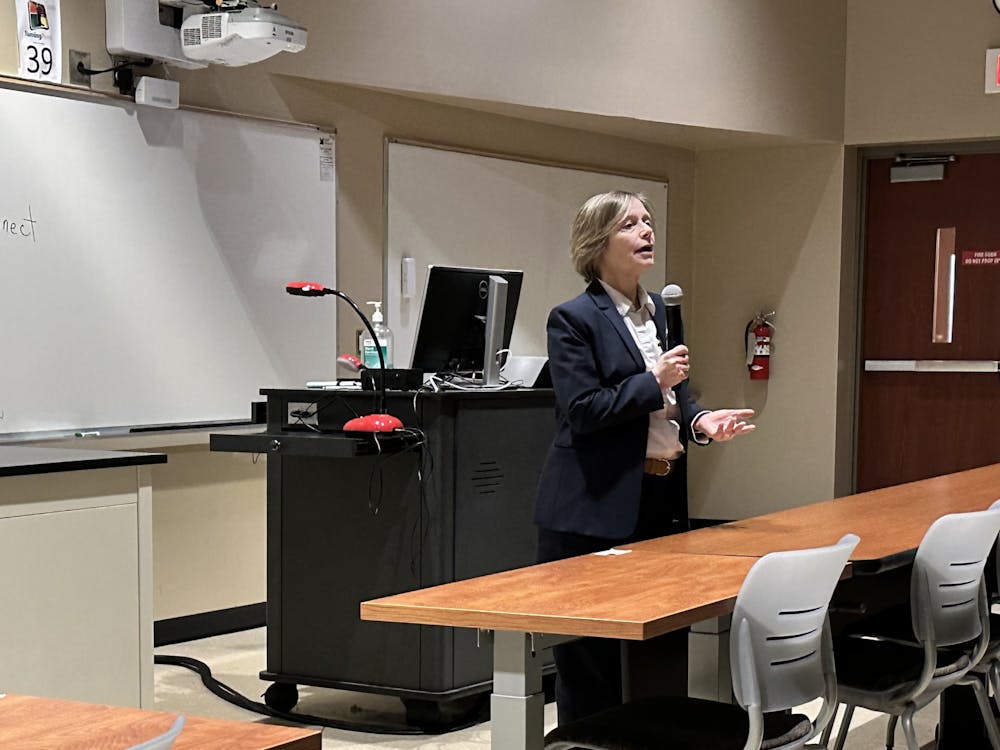By Emily Tate, Managing Editor
[media-credit name="Katie Hinh, Page Designer" align="alignnone" width="1170"][/media-credit]
The events that played out on Miami University's campus in the early morning hours of Sept. 14, 2014 have since led to a sexual assault allegation, several disciplinary meetings, a medical leave of absence that morphed into a suspension and, most recently, a lawsuit against the university and five of its employees.
With increased attention to sexual assault on college campuses across the country, this case shows the tangled and tortuous path that often lies ahead when an assault case enters a university's disciplinary process.
On that Saturday night last September, John and his roommate went to a party and, later, a bar. John had a lot to drink - at least eight beers and four shots of liquor, from what he can recall. He doesn't remember what happened after he left the bar.
But Jane does. She had also been out drinking that night, and on her way home, she met up with John and his roommate. They were all good friends. Jane had dated the roommate at one point and "made out" with John a few different times. She decided to stay at their dorm for the night.
When they thought the roommate had fallen asleep, Jane and John, whose names have been changed to protect their identities, began to kiss in John's bed.
"That was okay and what I expected and fine," Jane wrote in a statement to the Office of Ethics and Student Conflict Resolution (OESCR), which adjudicates student accusations of sexual assault, among other offenses.
But beyond the kissing, Jane didn't want anything else to happen.
"He had asked me to do things before, and I had said no," she wrote, "and he had kept pressuring me to do things, and I had said no, no, no."
In his bed on this particular night, he asked her again. She relented, because she "was tired of him asking." But when he asked to perform oral sex, she said, "No, you are not doing that." He did it anyway. She pushed him away, and he fell asleep.
John does not have a different version of this story because he can't remember any of it - only Jane "joining him in bed" at some point, according to his 55-page lawsuit. John says he was "blacked out."
Enjoy what you're reading?
Signup for our newsletter
The next day, he apologized "a ton" about what happened. Jane, in her statement for OESCR, said she forgave him and wanted to be friends. Her texts to John around 11 p.m. reflect that.
Jane: "You know I'm not mad at you right"
John: "I know Everyone else is mad at me."
John: "Im sorry about everything [Jane] I truly am."
Jane: "I know, I'm not mad. I'm just upset about it"
John: "So am I That's not me Im disgusted with myself."
John had asked her not to tell anyone what happened, but it was too late. Jane had already told two friends.
One of those friends told their Resident Assistant (RA) in Stonebridge Hall. And when the RA contacted her supervisors, and expressed concern that the allegations might cause John to harm himself, the university took over.
(None of the principals in this story would agree to be interviewed. Factual details and quotations are drawn entirely from court records and testimony.)
In the following days, things moved quickly. John was called to a meeting with Mike Curme, dean of students. Curme, who declined to comment for this story, told John he was not to contact Jane or come within 150 feet of her. The same day, John began to see a psychologist.
Over the next week, John "experienced depression, anxiety and isolation" as other students began to gossip. The same friend who talked to the RA had also told "myriad others" that John had sexually assaulted Jane, according to John's lawsuit.
John's psychologist recommended he take a medical leave of absence from Miami and return home to Connecticut. Curme approved the leave on Sept. 24, the day after OESCR staff notified John that they were aware of the sexual assault allegation.
In the weeks that followed, John had several meetings with OESCR. After an Oct. 7 hearing, where John was found responsible for violating Section 103 (Sexual Misconduct) of the Student Code of Conduct, he was suspended through May 2015.
John appealed the suspension first to the director of the University Appeals Board, Rose Marie Ward. She rejected his request on Nov. 11. Ward declined to comment.
John appealed a second and final time to Jayne Brownell, the vice president for student affairs. Brownell rejected his appeal, but reduced his suspension to Jan. 23, 2015. Brownell did not respond to requests for comment.
Although John has been allowed to return to Miami since the start of the Spring 2015 semester, he has chosen to remain at home in Connecticut, where, according to his lawsuit, he "continues to receive treatment for psychological and emotional trauma" caused by the defendants.
John's attorney, Eric Rosenberg, filed John's suit in U.S. District Court in Cincinnati on Sept. 17, 2015 - almost a year to the day since John's troubles began - claiming that Miami discriminated against John on the basis of his gender and violated his right to due process.
The suit names Miami University and six individual defendants, including Jane; Ward; Brownell; Susan Vaughn, the director of OESCR; and Alana Van Gundy-Yoder and Steven Elliot, two Miami professors who heard John's case on the administrative hearing panel. It identifies the two key players as John and Jane Doe, seeking to protect their privacy.
Miami hired Doreen Canton of Taft, Stettinius & Hollister, a major Cincinnati-based law firm, to represent the university in the lawsuit. Robin Parker, Miami's general counsel, provided an email statement on behalf of Miami.
"We deny the claims in this lawsuit and will vigorously defend the university and the faculty and staff named in the lawsuit," Parker said. "Miami University's student disciplinary process is designed to hold individuals accountable for their behavior in a manner that assures a fair and impartial process and respects the integrity of all involved."
"In [this] case … the accused had legal counsel, had the opportunity to object to any member of the hearing panel, and received a full and fair hearing," she said. With these measures in place, and after two appeals, John was repeatedly found responsible for his actions.
On Nov. 17, Miami asked the District Court to dismiss the suit. The court has yet to rule on that request.
John's legal complaints are multifaceted and many, but his main argument is that Miami violated his Title IX and due process rights.
Title IX is a federal law that prohibits gender discrimination in education. John says Miami broke the law by conducting a gender-biased disciplinary process and sexual assault investigation.
"In my case … the university has gone far beyond the original intent of Title IX and has ignored the evidence in order to bolster its Title IX record . . . to my great detriment," John wrote in his appeal to Brownell. He suggested the university had cracked down on sexual assault cases to protect its federal funding.
John argues that Van Gundy-Yoder's presence on the OESCR hearing panel biased the proceedings against him because she has published works on feminist theory. Miami rebutted the claim by saying John was given the names of the panelists, including Van Gundy-Yoder, two days before the hearing, with the option of objecting to their involvement in his case.
John also argues that, because he was intoxicated on Sept. 14, he "lacked the capacity to consent [to sexual activity] because he was incapacitated by alcohol." Miami, in response, cited several prior court decisions that rejected such arguments.
"Plaintiff never complained that he was sexually assaulted by Jane Doe," Miami's attorney wrote in its motion to dismiss. "Rather, he attempted to use his own intoxication as a defense to his actions."
Further, Miami says John's version of what happened between him and Jane is "one-sided." For example, the complaint dramatically downplays Jane's persistence in saying "no" to John's sexual advances on Sept. 14.
John also believes he was denied his due process rights. He says that early in the disciplinary process, he was not informed he could have an attorney, and that Jane was allowed more time to prepare witnesses, supporting evidence and written statements for the hearing than he was given.
To these, Miami says he was advised about the attorney, and that the university is required to provide special accommodations to alleged victims of sexual assault.
In its 33-page motion to dismiss the case, Miami disputes John's arguments, one by one, "for failure to set forth facts or legal claims … sufficient to state a claim against these defendants upon which relief may be granted."
Additionally, John says Jane maliciously defamed him by telling others he had sexually assaulted her, which intentionally caused him emotional distress.
Jane hired a separate attorney, Danny Caudill, who requested extra time to respond to John's complaint. He said the 21-day extension, which ends next Tuesday, Dec. 8, is justified because Jane and John "are currently discussing settlement options and the extension will permit [them] to complete that discussion."
The nature of these settlement options, and the reason Jane sought her own counsel, are unknown. At the time of publication, Caudill could not be reached for comment.
If U.S. District Judge Michael R. Barrett does not dismiss the lawsuit, John has several desired outcomes. He requests that a jury hear his case, that his disciplinary record be expunged and that the university award him $75,000 in damages.
Elliot and Rosenberg were among those who declined to comment for this story. John's roommate, Brownell, Van Gundy-Yoder and Vaughn did not respond to requests for comment.




